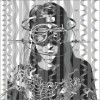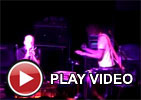Masaki Batoh, "Brain Pulse Music"
 Masaki Batoh, guitarist and leader of the Japanese psych-rock collective Ghost, is a man of many pursuits: music, acupuncture, science and spirituality. His first solo recording since the mid '90s is a result of years of research into bioelectric functions of the human brain, and the national tragedy that struck his home country while working on the album in Tokyo, Japan.
Masaki Batoh, guitarist and leader of the Japanese psych-rock collective Ghost, is a man of many pursuits: music, acupuncture, science and spirituality. His first solo recording since the mid '90s is a result of years of research into bioelectric functions of the human brain, and the national tragedy that struck his home country while working on the album in Tokyo, Japan.
Batoh initially conceived of Brain Pulse Music by commissioning a device called the Brain Pulse Music (BPM) machine. Essentially, Batoh's aim was to translate brain waves—activity from the frontal and parietal lobes—into electronic sound. Tragically, when the Great East Earthquake hit Japan in March 2011, Batoh's goals with the BPM project took a sharp left turn, and it's impossible not to feel moved by the story: Batoh used his BPM machine (and its "music") to help reconcile and treat the spiritual needs of his acupuncture patients, while the album is intended as a prayer and requiem for his disaster-stricken country. (Oh, and a consumer-friendly version of the BPM machine—purportedly not unlike a guitar effects pedal—is forthcoming.)
As for the music itself, Brain Pulse Music is a bit of a mixed bag—sometimes more interesting to read about than to listen to. It is composed of two recordings from Batoh's BPM machine, as well as five recordings based on melodies and rhythms heard in Japanese religious rituals, played on traditional instruments. Concept aside, the BPM recordings sound straight out of a science fiction novel—amelodic, atonal, inhuman—which is just fine, except they aren't a compelling listen. Perhaps if used in an acupuncture setting they function differently; as is, they don't bring about any of the "inner peace" that Batoh might have been striving for. Honestly, I'm not sure what else to expect from a recording made by tracking human eye movements with two separate BPM machines ("Eye Tracking Test"), in which Batoh's concept and creative process are far more interesting than the end result heard on tape.
Fortunately, Batoh has augmented much of this music, based on the BPM machine's wave forms, with traditional Japanese instrumentation, which injects these inorganic, mechanical forms with natural life. At its best, the BPM machine creates a warm harmonic drone, which is sufficiently more interesting when combined with ancient folk idioms than on its own. Batoh has assembled a variety of acoustic instruments—flutes, wind pipes, gongs, wood blocks, Buddhist bells, even Shinto chanting—to bring his compositions to life. The result is worlds away from the American and European music in which many of us are immersed from birth. The easiest parallel is to Ghost's fine excursions into subdued psychedelia; unlike Ghost, Brain Pulse Music is more sounds than songs, which lessens the impact. Still, Batoh does a fine job curating the sounds of his country's folk music—chimes and bells, ceremonial percussion, wooden drum hits, bright flute melodies—into pieces that soothe, calm, and lull one's mind into a sense of peaceful tranquility.
The final track, "Aiki No Okami," is a startling diversion from the album's template, an attempt by Batoh to replicate the earthquake's effect (and to purge the anguish it has caused his country) with pure sound. He combines harsh bursts of BPM machine dissonance with distorted percussion, while the track's title—which translates to "Great Spirit of Aiki"—is chanted. Eventually, the noise rises to a piercing crescendo. Played at high volume, this is impactful and moving sound, acknowledging the natural disaster that inspired it while straining to match its impact blow for blow. While "Aiki No Okami" sounds quite unlike the preceding album, it shares the same intentions: music as therapeutic device, intended for healing.
As a worthwhile side note, Batoh is offering a well-intentioned incentive to buy, not download, the album (putting his money where his mouth is): all proceeds from Brain Pulse Music go to earthquake disaster victims through Japan Red Cross.
Samples:



